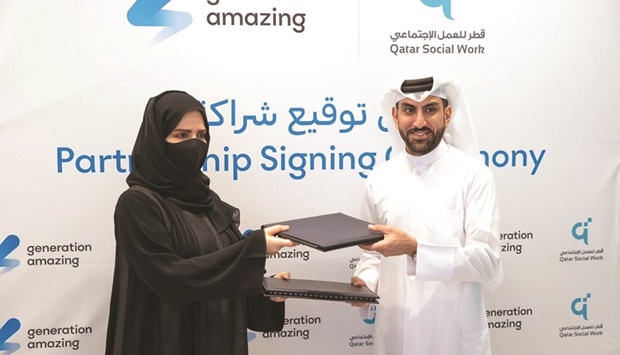* Partnership will run football for development programmes across country
The FIFA World Cup Qatar 2022 legacy project, Generation Amazing, has signed a memorandum of understanding (MoU) with Qatar Foundation for Social Work (QFSW) to deliver new football for development and life skill programmes in Qatar.
The QFSW was founded in 2013 as a private institution for the benefit of the public to govern and regulate various civil initiatives in Qatar.
The QFSW’s work focuses on the human and social development of Qatari society in various fields, including family stability, orphan care, women and child protection, youth empowerment, care and rehabilitation for people with disabilities, and elderly care, in addition to promoting behavioural health, the Supreme Committee for Delivery & Legacy (SC) has said in a statement.
The QFSW and Generation Amazing will deliver a range of programmes and events in Qatar to promote inclusion and social and human development for beneficiaries across the country.
The partnership will contribute to human development as part of Qatar National Vision 2030 and raise awareness about the integration of persons with disability into society.
Established in 2010 during Qatar’s successful bid for the FIFA World Cup, Generation Amazing uses football for development initiatives to teach social and life skills in line with the United Nations Sustainable Development Goals (SDGs).
“The partnership with the QFSW provides strong alignment to the overall vision and mission of both organisations,” said HE Hassan al-Thawadi, secretary-general of the SC. “We will work together on programmes that support the development of social and emotional skills in safe and supportive environments, allowing both Generation Amazing and the QFSW centres to reach out to people in Qatar and promote key life skills and values through football.”
Generation Amazing will work closely with different centres under the QFSW umbrella, namely Nama, Shafallah, Wifaq, Dreama, Ehsan, Aman, Alnoor and BHC, to target children with autism, learning difficulties, the visually impaired, the deaf, and children and orphans with physical impairments and other disabilities.
In addition, participants will have the chance to volunteer at events such as the Generation Amazing Festival and take part in youth leadership programmes and workshops.
Training for the programme will be held at the newly launched Generation Amazing Community Club in Lusail.
QFSW chief executive Ahmad bin Mohamed bin Yousef al-Kuwari said: “Our success in the field of social and human development is dependent on the co-operation and co-ordination between the QFSW and its centres with all governmental and private sectors, and the civil society, as well as the formation of a network of partners for support and advocacy at the national, regional and international levels.”
“We look forward to working with Generation Amazing and utilising their football for development practices to strengthen our impact to support and develop members of different communities in Qatar,” he added.
Going forward, the programme plans to build the capacity of coaches to deliver football for development activities that are ability-friendly, and contextualise them to enhance the experience of beneficiaries and deliver sessions that would improve their skills.
The QFSW was founded in 2013 as a private institution for the benefit of the public to govern and regulate various civil initiatives in Qatar.
The QFSW’s work focuses on the human and social development of Qatari society in various fields, including family stability, orphan care, women and child protection, youth empowerment, care and rehabilitation for people with disabilities, and elderly care, in addition to promoting behavioural health, the Supreme Committee for Delivery & Legacy (SC) has said in a statement.
The QFSW and Generation Amazing will deliver a range of programmes and events in Qatar to promote inclusion and social and human development for beneficiaries across the country.
The partnership will contribute to human development as part of Qatar National Vision 2030 and raise awareness about the integration of persons with disability into society.
Established in 2010 during Qatar’s successful bid for the FIFA World Cup, Generation Amazing uses football for development initiatives to teach social and life skills in line with the United Nations Sustainable Development Goals (SDGs).
“The partnership with the QFSW provides strong alignment to the overall vision and mission of both organisations,” said HE Hassan al-Thawadi, secretary-general of the SC. “We will work together on programmes that support the development of social and emotional skills in safe and supportive environments, allowing both Generation Amazing and the QFSW centres to reach out to people in Qatar and promote key life skills and values through football.”
Generation Amazing will work closely with different centres under the QFSW umbrella, namely Nama, Shafallah, Wifaq, Dreama, Ehsan, Aman, Alnoor and BHC, to target children with autism, learning difficulties, the visually impaired, the deaf, and children and orphans with physical impairments and other disabilities.
In addition, participants will have the chance to volunteer at events such as the Generation Amazing Festival and take part in youth leadership programmes and workshops.
Training for the programme will be held at the newly launched Generation Amazing Community Club in Lusail.
QFSW chief executive Ahmad bin Mohamed bin Yousef al-Kuwari said: “Our success in the field of social and human development is dependent on the co-operation and co-ordination between the QFSW and its centres with all governmental and private sectors, and the civil society, as well as the formation of a network of partners for support and advocacy at the national, regional and international levels.”
“We look forward to working with Generation Amazing and utilising their football for development practices to strengthen our impact to support and develop members of different communities in Qatar,” he added.
Going forward, the programme plans to build the capacity of coaches to deliver football for development activities that are ability-friendly, and contextualise them to enhance the experience of beneficiaries and deliver sessions that would improve their skills.

